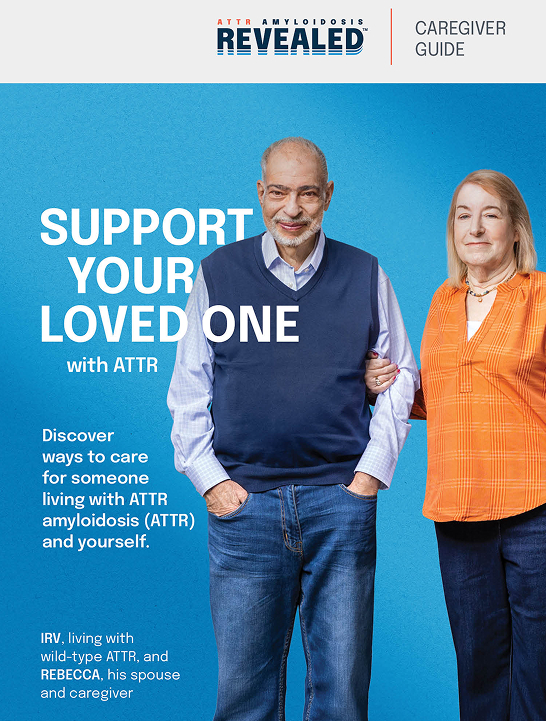Caregivers are pillars of strength and support
When someone has been diagnosed with ATTR amyloidosis (ATTR), the symptoms that can come with the disease may require someone, such as a family member, to become a caregiver.
In addition to being a source of physical and emotional support, caregivers play an important role in advocating for the health and well-being of someone living with ATTR. Becoming a caregiver is a significant responsibility and can present challenges that require lifestyle changes.
We’re here to help. This website provides helpful tips and disease information for caregivers of someone living with ATTR.
Learn more about ATTR
It’s important to learn about the symptoms of ATTR and what causes ATTR to help keep track of your loved one’s condition and be able to communicate effectively with their doctor.
Staying organized is key
ATTR affects several parts of the body, so someone living with the disease may see several doctors, including a primary care doctor, cardiologist, and neurologist. To stay organized for these visits, consider creating a Health Record.
Managing the healthcare journey together
Life can get hectic, and it can be easy to forget to mention a symptom, concern, or condition the person that you’re caring for may have when meeting with their doctor. A Health Record will help you stay focused during the visit so you can advocate for your loved one’s health.
- Working together to create and maintain an up-to-date Health Record can help ease the stress of preparing for doctor visits
- A Health Record can also make it easier for someone else to fill in as caregiver when you’re taking personal time for self-care or if you suddenly become unavailable
What to include in a Health Record
EXPAND ALLHIDE ALL
List of symptoms
 List of symptoms
List of symptoms
Keeping track of all symptoms, even if they seem minor or unrelated, can make it easier when talking to a doctor about managing the disease. Track symptoms with the Symptoms Checklist & Tracker to share with the healthcare team.
Medical history
 Medical history
Medical history
Include any important information related to medical history, including current and past diagnoses, surgeries, or other medical conditions.
List of medications
 List of medications
List of medications
Keep a diary or log of all medications so you can provide this information to the healthcare team without relying on memory.
Contact information
 Contact information
Contact information
Keep all relevant information in one spot for quick access. Include doctors, insurance, support groups, family members, and emergency contact information.

IRV, living with wild-type ATTR (wtATTR), and REBECCA, his spouse and caregiver
Be vocal
Living with ATTR can be both physically and mentally exhausting, and it can get overwhelming to communicate with the healthcare team. When caregivers and advocates speak up, it can help the doctor with making decisions on how to manage the disease. If you notice seemingly unrelated symptoms affecting multiple parts of the body that your loved one is struggling with, speak up. Every bit of information counts.
Have an open dialogue
Communication is one of the most important elements of caregiving, as it helps form a stronger bond between you and your loved one. Open communication with the healthcare team is also vital to managing your loved one's health.
Take time to care for yourself
It’s important to look out for your own well-being when taking care of others. Try to interact socially outside the caregiving environment and continue focusing on your own health with exercise, sleep, and a balanced diet.
IN THIS SECTION
Track Your Loved One's Symptoms
Use the checklist to share your loved one's symptoms with their doctor.

Save the Caregiver Brochure
A guide with information and tips for those taking care of their loved ones.
